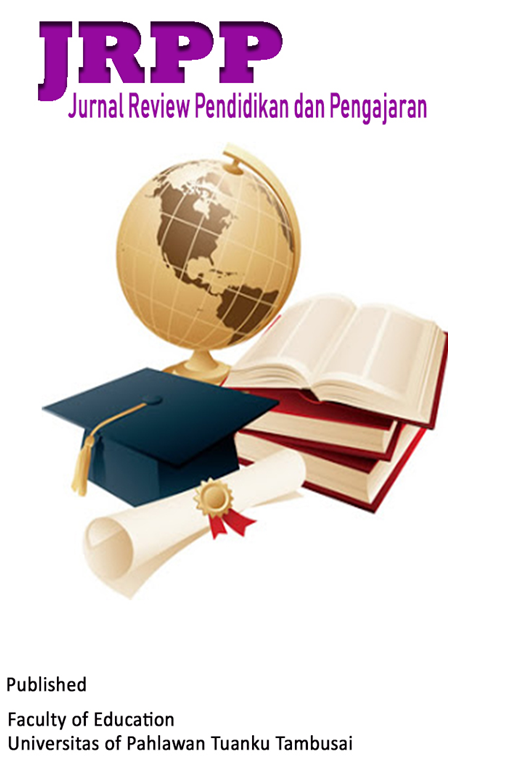TELAAH DAMPAK POSITIF GAYA KEPEMIMPINAN TRANSFORMASIONAL BAGI PENINGKATAN PRODUKTIVITAS INDIVIDU DAN ORGANISASI
DOI:
https://doi.org/10.31004/cdj.v4i1.12483Keywords:
Kepemimpinan, Transformasional, Produktivitas, Kinerja, OrganisasiAbstract
Dewasa ini penting bagi organisasi menyadari bahwa dunia bisnis telah banyak berubah menjadi lebih inovatif dan kompetitif. Sebagian organisasi yang unggul memiliki pemimpin hebat yang dapat memantau dan mengawasi perilaku dan kinerja karyawan. Studi ini memiliki tujuan untuk menjelaskan secara detail bagaimana dampak positif gaya kepemimpinan jika diterapkan di sebuah organisasi bisnis. Tentu saja, peneliti merujuk referensi berkualitas demi meyakinkan para pembaca dan pemangku kepentingan. Penelitian ini berjenis kualitatif. Teknik pengumpulan data meliputi menyimak dan mencatat informasi penting untuk melakukan analisis data melalui reduksi data, display data, dan penarikan kesimpulan. Studi ini tiba pada kesimpulan bahwa pemimpin organisasi harus menggunakan gaya kepemimpinan yang spesifik untuk mendorong karyawan menjaga komitmen dan menciptakan ikatan emosional sehingga visi dan tujuan organisasi dapat tercapai dan dapat bertahan serta berkembang bahkan ketika krisis melanda. Situasi ini dapat diatasi dengan gaya kepemimpinan transformasional. Hasil penelitian ini bisa dijadikan rujukan bagi penelitian berikutnya jika memiliki topik sejenis. Namun, dengan metode penelitian berbeda yakni kuantitatif agar bisa mengkonfirmasi ulang validitas temuan studi terdahulu.References
Abasilim, U. D., Gberevbie, D. E., & Osibanjo, O. A. (2019). Leadership Styles and Employees’ Commitment: Empirical Evidence from Nigeria. SAGE Open, 9(3), 1–15. https://doi.org/10.1177/2158244019866287
Ag Budin, D. K., & Wafa, S. A. (2015). The relationship between culture and leadership style preference among Malay-Brunei, Bajau and Kadazan-Dusun community in Sabah, Malaysia. Journal of Management Development, 34(10), 1202–1210. https://doi.org/10.1108/JMD-02-2015-0019
Akbar, Royhul., Noermijati., & Troena, E. Afnan. (2016). Pengaruh Gaya Transformational leadershipdan Stres Kerja terhadap Kinerja Pegawaidengan Dimediasi oleh Job satisfaction (Studi pada KPPN Makassar 1 dan KPPN Makassar 2). Jurnal Aplikasi Manajemen (JAM), 14(3), 537–545.
Ali, N. M., Jangga, R., Ismail, M., Kamal, S. N.-I. M., & Ali, M. N. (2015). Influence of Leadership Styles in Creating Quality Work Culture. Procedia Economics and Finance, 31, 161–169. https://doi.org/10.1016/S2212-5671(15)01143-0
Almeshref, Y., & Khwanda, H. (2022). Information Systems Effect on Enabling Knowledge Management. International Journal of Professional Business Review, 7(5), 1–27. https://doi.org/10.26668/businessreview/2022.v7i5.e834
Andriani, S., Kesumawati, N., & Kristiawan, M. (2018). The Influence of The Transformational Leadership and Work Motivation on Teachers Performance. International Journal of Scientific & Technology Research, 7(7), 19–29.
Ausat, A. M. A. (2023). The Application of Technology in the Age of Covid-19 and Its Effects on Performance. Apollo - Journal of Tourism and Business, 1(1), 14–22. https://doi.org/10.58905/apollo.v1i1.8
Ausat, A. M. A., & Peirisal, T. (2021). Determinants of E-commerce Adoption on Business Performance: A Study of MSMEs in Malang City, Indonesia. Journal On Optimizations of Systems at Industries, 20(2), 104–114. https://doi.org/10.25077/josi.v20.n2.p104-114.2021
Ausat, A. M. A., Siti Astuti, E., & Wilopo. (2022). Analisis Faktor Yang Berpengaruh Pada Adopsi E-commerce Dan Dampaknya Bagi Kinerja UKM Di Kabupaten Subang. Jurnal Teknologi Informasi Dan Ilmu Komputer (JTIIK), 9(2), 333–346. https://doi.org/10.25126/jtiik.202295422
Ausat, A. M. A., & Suherlan, S. (2021). Obstacles and Solutions of MSMEs in Electronic Commerce during Covid-19 Pandemic: Evidence from Indonesia. BASKARA: Journal of Business and Entrepreneurship, 4(1), 11–19. https://doi.org/10.54268/BASKARA.4.1.11-19
Ausat, A. M. A., Suherlan, S., Peirisal, T., & Hirawan, Z. (2022). The Effect of Transformational Leadership on Organizational Commitment and Work Performance. Journal of Leadership in Organizations, 4(4), 61–82. https://doi.org/10.22146/jlo.71846
Ausat, A. M. A., Widayani, A., Rachmawati, I., Latifah, N., & Suherlan, S. (2022). The Effect of Intellectual Capital and Innovative Work Behavior on Business Performance. Journal of Economics, Business, & Accountancy Ventura, 24(3), 363–378. https://doi.org/10.14414/jebav.v24i3.2809
Bass, B. M. (1985). Leadership and performance beyond expectations. Academy of Management Review, 12(4), 756–757. https://doi.org/10.3/JQUERY-UI.JS
Bass, B. M., Avolio, B. J., Jung, D. I., & Berson, Y. (2003). Predicting unit performance by assessing transformational and transactional leadership. Journal of Applied Psychology, 88(2), 207–218. https://doi.org/10.1037/0021-9010.88.2.207
Belawati, F. E., Setyadi, D., & Hendri, M. I. (2019). Effect of Transformational Leadership Style and Knowledge Management on Organizational Innovation through Empowerment, Member Creativity and Learning Organization. Journal of Arts & Humanities, 8(8), 1–16. https://doi.org/10.18533/journal.v8i8.1699
Buble, M., Juras, A., & Mati?, I. (2014). The relationship between managers’ leadership styles and motivation. Management: Journal of Contemporary Management, 19(1), 161–193. https://hrcak.srce.hr/124612
Casimir, A., Nkechinyere, O., Canon, R., Ugwu, C., & Okpara, M. (2013). Philosophical Expositions of Leadership and Human Values in Catholic Social Teachings: Resolving Nigeria’ s Leadership Deficit and Underdevelopment. Open Journal of Philosophy, 3(3), 391–400. https://doi.org/10.4236/ojpp.2013.33059 Philosophical
Dastane, O. (2020). Impact of Leadership Style on Employee Performance: A Moderating Role of Gender. Australian Journal of Business and Management Research New, 05(12), 27–52.
Drzewiecka, M., & Roczniewska, M. (2018). The relationship between perceived leadership styles and organisational constraints: An empirical study in Goleman’s typology. European Review of Applied Psychology, 68(4–5), 161–169. https://doi.org/10.1016/j.erap.2018.08.002
Han, S. (2020). The link between transformational leadership and work-related performance: moderated-mediating roles of meaningfulness and job characteristics. Leadership & Organization Development Journa, 41(4), 519–533. https://doi.org/10.1108/LODJ-04-2019-0181
Ikhram W, M. A. D., & Fuadiputra, I. R. (2021). The Impact of Transformational Leadership Style and Culture on the Performance of MSME Employee Through Mediation of Organizational Learning. Business and Accounting Research (IJEBAR), 5(3), 865–873. https://jurnal.stie-aas.ac.id/index.php/IJEBAR
Jung, D. I., Chow, C., & Wu, A. (2003). The role of transformational leadership in enhancing organizational innovation: Hypotheses and some preliminary findings. The Leadership Quarterly, 14(4–5), 525–544. https://doi.org/10.1016/S1048-9843(03)00050-X
Kim, S., & Kim, J. (2014). Integration Strategy, Transformational Leadership and Organozational Commitment in Korea’s Coorporate Split - offs Sung-gun Kim. Procedia - Social and Behavioral Sciences, 109, 1353–1364. https://doi.org/10.1016/j.sbspro.2013.12.637
Komsiyah, I. (2016). Kepemimpinan transformatif perkembangan dan implementasinya pada lembaga pendidikan. TA’ALLUM, 04(02), 293–316.
Kurniyati, N. N. (2018). Pengaruh Gaya Kepemimpinan Transformasional Terhadap Perilaku Iovatif Karyawan Dan Kinerja UMKM Kecamatan Kraton Yogyakarta. SOLUSI, 13(1), 31–54.
Li, H., Sajjad, N., Wang, Q., Ali, A. M., Khaqan, Z., & Amina, S. (2019). Influence of Transformational Leadership on Employees’ Innovative Work Behavior in Sustainable Organizations: Test of Mediation and Moderation Processes. Sustainability, 11(1594), 1–21. https://doi.org/10.3390/su11061594
Lyons, D. E., Young, A. G., & Keil, F. C. (2007). The hidden structure of overimitation. Proceedings of the National Academy of Sciences, 104(50), 19751–19756. https://doi.org/10.1073/pnas.0704452104
Manzoor, F., Wei, L., Nurunnabi, M., & Subhan, Q. A. (2019). The Impact of Transformational Leadership on Job Performance and CSR as Mediator in SMEs. Sustainability, 19(436), 1–14. https://doi.org/10.3390/su11020436
Muthuveloo, R., Kathamuthu, K., & Ping, T. A. (2014). Impact of Leadership Styles on Employee Adaptability in Call Center: A Perspective of Telecommunication Industry in Malaysia. Asian Social Science, 10(7), 96–106. https://doi.org/10.5539/ass.v10n7p96
Ng, T. W. H. (2017). Transformational leadership and performance outcomes: Analyses of multiple mediation pathways. The Leadership Quarterly, 28(3), 385–417. https://doi.org/10.1016/J.LEAQUA.2016.11.008
Pantouvakis, A., & Patsiouras, C. (2016). Exploring the role of leadership style on the service quality-customer satisfaction link. International Journal of Quality and Service Sciences, 8(1), 88–101. https://doi.org/10.1108/IJQSS-01-2015-0006
Prabowo, T. S., Noermijati, & Irawanto, D. W. (2018). Leadership and Work Motivation on Employee Performance Mediated by Job Satisfaction. Journal of Applied Management (JAM), 16(1), 171–178. https://doi.org/10.21776/ub.jam.2018.016. 01.20
Prahesti, D. S., Riana, G., Made, I., & Wibawa, A. (2017). Pengaruh Kepemimpinan Transformasional Terhadap Kinerja Karyawan Dengan OCB Sebagai Variabel Mediasi. E-Jurnal Ekonomi Dan Bisnis Universitas Udayana 6.7, 6(7), 2761–2788. https://doi.org/10.24843/EEB.2017.v06.i07.p06
Reza, M. H. (2019). Components of Transformational Leadership Behavior. Multidisciplinary Research, 5(3), 119–124.
Salim, A., Abdul, N., & Rajput, R. (2021). The Relationship Between Transformational Leadership, Prosocial Behavioral Intentions, and Organizational Performance. Journal of Asian Finance, Economics and Business, 8(1), 487–493. https://doi.org/10.13106/jafeb.2021.vol8.no1.487
Sikalieh, D. (2017). The Influence of Individualized Consideration Leadership Behaviour on Employee Performance in Small and Medium Enterprises in Kenya United States International University-Africa United States International University-Africa. International Journal of Business and Social Science, 8(2), 163–173.
Steinmann, B., Klug, H. J. P., & Maier, G. W. (2018). The Path Is the Goal: How Transformational Leaders Enhance Followers’ Job Attitudes and Proactive Behavior. Frontiers in Psychology, 9(November), 1–15. https://doi.org/10.3389/fpsyg.2018.02338
Subagja, A. D., Ausat, A. M. A., & Suherlan. (2022). The Role of Social Media Utilization and Innovativeness on SMEs Performance. Jurnal IPTEK-KOM (Jurnal Ilmu Pengetahuan Dan Teknologi Komunikasi), 24(2), 85–102. https://doi.org/https://doi.org/10.17933/iptekkom.24.2.2022.85-102
Sugiharti, Rr. R., Islami, F. S., & Octavia, L. P. (2021). Is Educated Labor Really Productive? Economics Development Analysis Journal, 10(1), 43–53.

Downloads
Published
How to Cite
Issue
Section
License
Copyright (c) 2023 Sutrisno Sutrisno, Humala Sitinjak, Prety Diawati, Imman Yusuf Sitinjak, Abu Muna Almaududi Ausat

This work is licensed under a Creative Commons Attribution-ShareAlike 4.0 International License.















